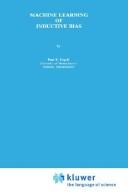| Listing 1 - 3 of 3 |
Sort by
|
Audio
Year: 2023 Publisher: London : Henry Stewart Talks,
Abstract | Keywords | Export | Availability | Bookmark
 Loading...
Loading...Choose an application
- Reference Manager
- EndNote
- RefWorks (Direct export to RefWorks)
Business enterprises --- Data processing. --- Artificial intelligence --- Customer relations. --- Customer services. --- Electronic commerce. --- Inductive bias. --- Industrial management. --- Machine learning --- Industrial applications. --- Technological innovations. --- ChatGPT.

ISBN: 0898382238 Year: 1986 Publisher: Dordrecht : Kluwer,
Abstract | Keywords | Export | Availability | Bookmark
 Loading...
Loading...Choose an application
- Reference Manager
- EndNote
- RefWorks (Direct export to RefWorks)
Artificial intelligence. Robotics. Simulation. Graphics --- Artificial intelligence --- -Inductive bias --- Machine learning --- 681.3*I26 --- Learning, Machine --- Machine theory --- AI (Artificial intelligence) --- Artificial thinking --- Electronic brains --- Intellectronics --- Intelligence, Artificial --- Intelligent machines --- Machine intelligence --- Thinking, Artificial --- Bionics --- Cognitive science --- Digital computer simulation --- Electronic data processing --- Logic machines --- Self-organizing systems --- Simulation methods --- Fifth generation computers --- Neural computers --- Data processing --- Learning: analogies; concept learning; induction; knowledge acquisition; language acquisition; parameter learning (Artificial intelligence)--See also {681.3*K32} --- 681.3*I26 Learning: analogies; concept learning; induction; knowledge acquisition; language acquisition; parameter learning (Artificial intelligence)--See also {681.3*K32} --- Inductive bias
Book
ISBN: 0691225990 Year: 2021 Publisher: Princeton : Princeton University Press,
Abstract | Keywords | Export | Availability | Bookmark
 Loading...
Loading...Choose an application
- Reference Manager
- EndNote
- RefWorks (Direct export to RefWorks)
At the heart of human intelligence rests a fundamental puzzle: How are we incredibly smart and stupid at the same time? No existing machine can match the power and flexibility of human perception, language, and reasoning. Yet, we routinely commit errors that reveal the failures of our thought processes. 'What Makes Us Smart' makes sense of this paradox by arguing that our cognitive errors are not haphazard. Rather, they are the inevitable consequences of a brain optimized for efficient inference and decision making within the constraints of time, energy, and memory - in other words, data and resource limitations. Framing human intelligence in terms of these constraints, Samuel Gershman shows how a deeper computational logic underpins the 'stupid' errors of human cognition.
Cognition --- Cognitive psychology. --- Age factors. --- Psychology, Cognitive --- Cognitive science --- Psychology --- Age factors in cognition --- Ability, Influence of age on --- Cognition. --- Intellect. --- Human intelligence --- Intelligence --- Mind --- Ability --- Thought and thinking --- Accuracy and precision. --- Action potential. --- Ad hoc hypothesis. --- Ad hominem. --- Adaptive bias. --- Almost surely. --- Alternative hypothesis. --- Altruism. --- Ambiguity. --- Analogy. --- Anecdote. --- Approximation. --- Attractiveness. --- Bayes' theorem. --- Bayesian inference. --- Bayesian probability. --- Bayesian. --- Behavior. --- Circular reasoning. --- Cognitive flexibility. --- Cognitive style. --- Commitment device. --- Confidence. --- Confirmation bias. --- Conspiracy theory. --- Controllability. --- Counterintuitive. --- Credibility. --- Decision-making. --- Effectiveness. --- Efficacy. --- Efficiency. --- Efficient coding hypothesis. --- Efficient frontier. --- Estimation. --- Expected value. --- Explanation. --- Fair coin. --- Fair market value. --- Gimmick. --- Guessing. --- Heuristic. --- Hot Hand. --- Human intelligence. --- Hypothesis. --- Illusion of control. --- Inductive bias. --- Inference. --- Intelligent design. --- Learnability. --- Lightness (philosophy). --- Likelihood function. --- Logical extreme. --- Logical reasoning. --- Moral hazard. --- Motivated reasoning. --- Mutual exclusivity. --- Natural approach. --- Normative. --- Observation. --- Observational learning. --- Of Miracles. --- Opportunity cost. --- Optimism bias. --- Optimism. --- Our Choice. --- Pairwise comparison. --- Perfect rationality. --- Physical attractiveness. --- Point estimation. --- Politeness. --- Positive feedback. --- Predictability. --- Prediction. --- Predictive coding. --- Predictive power. --- Principle of rationality. --- Prior probability. --- Probability. --- Prosocial behavior. --- Quantity. --- Rational agent. --- Rational choice theory. --- Rationality. --- Reason. --- Reinforcement learning. --- Result. --- Self-control. --- Sophistication. --- Spontaneous recovery. --- Strong inference. --- Suggestion. --- Theory. --- Thought. --- Truth value. --- Uncertainty. --- Utility. --- Value of information. --- With high probability. --- PSYCHOLOGY / Cognitive Psychology & Cognition --- COMPUTERS / Logic Design
| Listing 1 - 3 of 3 |
Sort by
|

 Search
Search Feedback
Feedback About UniCat
About UniCat  Help
Help News
News